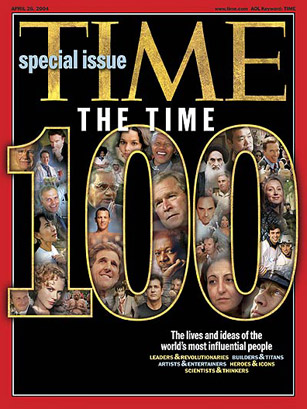
If you want to know the forces that are changing the world we live in, you will find some answers in maps, statistics and graphs. But you will not have met the future until you make your acquaintance with a few of the most irresistible forces of all. As history has demonstrated, a relative handful of humans with strong ideas and a determination to pursue them has an outsize impact on the rest of us. If the great men and women of ancient times were kings and queens, nautical explorers and epic poets, now we have superpower Presidents, technological titans and religious zealots who can upend the status quo in a nanosecond. Who is that core group today? Let us introduce you to the TIME 100, the most powerful and influential people of 2004.
How did we choose them? Given that no objective measure is possible when it comes to human beings, we identified three rather distinct qualities among those who shape our lives. First there were those who came to their status by means of a very public possession of power. President George W. Bush is the pre-eminent example. Others, though they are rarely heard from in public, nonetheless have a real influence on the great events of our time. Think of Ali Husaini Sistani, the Grand Ayatullah of Iraq's Shi'ites, who in effect has a veto on plans to transfer power from those who occupy his country to its people. Still others affect our lives through their moral example. Consider Nelson Mandela's forgiveness of his captors and his willingness to walk away from the South African presidency after a single term.
The list of those who, in our judgment, are the 100 most consequential people (in some cases, pairs and partners) in the world right now reflects these three ways in which greatness can transform the lives and thoughts of millions—and not always in ways that we like to admit. The President of China has power—that much goes without saying. So does Jerry Bruckheimer, the Hollywood producer, who can make pretty much any film or TV series that he wants, or Fidelity's Abigail Johnson, whose family firm controls the destiny of nearly $900 billion of mutual-fund money. But Kim Jong Il, the Dear Leader of North Korea, has power too — nuclear-weapons programs do that for you — despite the fact that his nation is an economic basket case. Stalin asked mockingly about the Pope, "How many divisions does he have?" Yet few would doubt that Pope John Paul II has changed countless lives. So, sadly, has Osama bin Laden, even though he is holed up in a remote village somewhere in the Hindu Kush with even fewer divisions, as conventionally measured, at his command than the modern papacy has ever had. Bin Laden's millennial ideology appeals to millions and impacts (think of the time you spend boarding a flight) those who despise it as well.
Among those included are plenty whose importance is a lot more subtle than bin Laden's or the Pope's. Bernard Lewis has been teaching since 1938, yet his theories on the failure of the Islamic world have only lately shifted the thinking of American policymakers. Bernard Kouchner and Samantha Power—one a French doctor, the other a U.S. scholar—have challenged us to understand that a nation's sovereignty does not give it the right to behave abominably inside its borders.
The heroes and icons on our list stand a little to one side. Some of them, to be sure, have power by any standard — Arnold Schwarzenegger is Governor of the most populous state in the U.S. Some of them have influence — otherwise, what would the doctor who invented the South Beach diet be doing in these pages? But we have a sneaking affection for the true heroes on the list, the people we admire because they have some quality, be it physical or moral, that sets them apart. The scarcely believable toughness of Lance Armstrong, the stubbornness of dissident Aung San Suu Kyi — these are examples of human attributes that inspire and amaze.
We don't imagine that any single reader of these pages will agree with all the choices we have made. But we think our list shows that greatness lives — that a few people can affect the lives of billions around the globe.